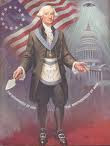Showing posts with label symbolics. Show all posts
Showing posts with label symbolics. Show all posts
Monday, June 14, 2010
Why and how is ritual and symbolism used?
Ask any member about Masonic ritual and he is likely to explain it as a unique and inspiring experience. Ritual is core in Freemasonry. This ritual is unique in that is uses a range of objects, symbols and scenarios to disseminate the values, traditions and philosophical precepts of Freemasonry. These rituals are centuries old and have been used in Freemasonry for hundreds of years. An example of such symbolism is the use of medieval stonemason working tools as a vehicle of instruction.
Symbols in the Lodge room are used to define the rank of a Freemason. The most widely recognized symbol of Freemasonry is the Square and Compasses. The Square teaches us to conduct ourselves properly – as in ’square conduct’, and the compasses teach us to keep our passions and prejudices within due bounds.
Members wear the symbol to remind themselves of their obligation to the lesson learned in their lodges and to identify their membership to other Freemasons and all people. Masonic symbols have wide meanings – some directly relate to the tools used by operative Masons and some represent the need for order and direction in life.
Labels:
fraternity,
free,
freemasonry,
freemind,
ritual,
symbolical,
symbolics,
symbolism,
symbols
The Three Symbolic Degrees

Having been elected to receive the degrees of Masonry, the candidate proceeds to do just that. (In a few states a candidate is balloted upon between each of the degrees, in all other states one election is for all three degrees.)
The first degree is that of entered apprentice and during it the candidate is introduced to the basic principles of Freemasonry. As noted in an earlier chapter, symbolic use of various building tools is employed to impress upon him moral truths and doctrines. The degree is serious throughout and, contrary to some wild tales occasionally circulated, there is never any horseplay or frivolity involved (this is true of all three symbolic degrees). Upon completion of the degree, the candidate begins learning a catechism in which he must become proficient before he may receive the next degree.
In the second degree he becomes a fellow craft, learning still more of the principles and teachings of Freemasonry, especially of its close alliance with the arts and sciences. Again, he must commit a catechism to memory before proceeding to the next degree.
The third and final degree is that of master mason, teaching still more of the moral truths of the fraternity, culminating with an impressive lesson concerning the rich rewards awaiting all good men. In most states the candidate must also memorize a catechism on this degree, in others it must be learned only if the new Mason desires to take additional steps, and in others it is not required at all.
The catechisms a Mason is required to learn as he progresses through the degrees are often, at the outset, regarded as considerable chores and candidates sometimes wonder why they are required at all. But they serve useful purposes for the fraternity and – although he may not realize it at the time – they are particularly useful to the Mason all through his life. It would be an extremely rare thing to ever hear a Mason regret having to learn the catechisms.
In committing the catechisms to memory the candidate is of necessity further impressed by the lessons and instructions he received in the degrees, for this is what the catechisms are all about. He thus begins his Masonic career a much more knowledgeable Mason than would otherwise be the case. He learns to memorize, an ability that will serve him and Masonry well through the years. When he visits a lodge in which he is not known to be a Mason, the knowledge he gained in learning his catechisms will enable him to prove his eligibility to visit. He will, as a good and active Mason, have many occasions to feel thankful for the lessons he learned in his catechisms.
Sometimes, despite their professions of good intent, men seek Masonic membership out of mere curiosity, or for other piddling reasons. The requirement that candidates learn the catechisms will often weed these out at an early stage, their motivations will not lend themselves to the effort required.
The catechisms pose no problem for men of reasonable intelligence and energy. It is rare to hear of anyone failing to learn a catechism if they really wanted to.
Subscribe to:
Posts (Atom)

